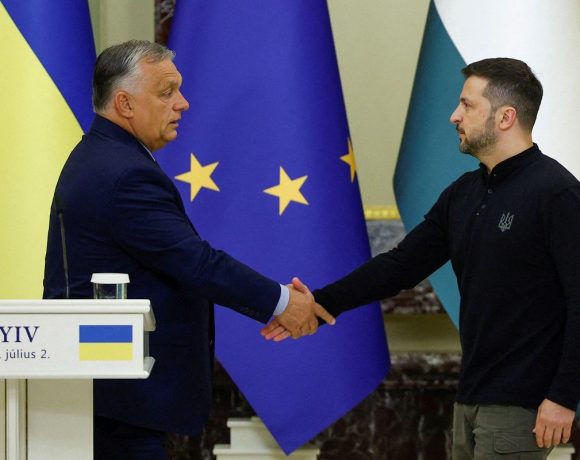
Viktor Orban arrived in Ukraine on Tuesday for an unannounced visit shortly after assuming the role of rotating president of the European Union. While in Kyiv, the Hungarian prime minister suggested that a ceasefire between Russia and Ukraine could expedite negotiations to end the ongoing conflict, which began with Russia’s full-scale invasion in 2022.
Orban, known for his critical stance on Western support for Ukraine and close ties with Russian President Vladimir Putin, has not visited Ukraine in 12 years but has met with Putin several times. During his joint appearance with Ukrainian President Volodymyr Zelensky, their body language was notably reserved, and neither took questions from the media.
Orban previously delayed the agreement on a €50 billion EU aid package meant to support Ukraine against Russia. However, his new role as head of the European Council for the next six months grants him significant influence as a European figurehead. He emphasized the need to resolve past disagreements and focus on future cooperation during his discussions in Ukraine.
Zelensky stressed the importance of maintaining Europe’s support for Ukraine and fostering meaningful, mutually beneficial cooperation among European neighbors. Orban highlighted the necessity of collaboration and proposed a ceasefire to hasten peace negotiations with Russia, expressing gratitude for Zelensky’s candid responses.
Orban stated that his visit underscored the importance of peace not just for Ukraine but for all of Europe, acknowledging the war’s profound impact on European security. Zelensky did not publicly respond to Orban’s ceasefire comments but later posted on X, emphasizing the significance of European unity and collective action. He described their discussion as focused on achieving a just, lasting, and fair peace.
Many Ukrainians view a ceasefire as potentially solidifying Russia’s control over seized territories and prefer negotiations from a position of strength. Ukrainian Foreign Minister Dmytro Kuleba expressed openness to working with all parties to solve problems, acknowledging the challenges but emphasizing the potential for tangible results.
During Orban’s visit, he and Zelensky also addressed bilateral issues, including the status of the 100,000 ethnic Hungarians living in Ukraine. Orban expressed optimism about progress on the rights of ethnic Hungarians and wished Ukraine success. The EU had initiated membership talks for Ukraine just before Hungary assumed the EU Council Presidency.
Picture Courtesy: google/images are subject to copyright
